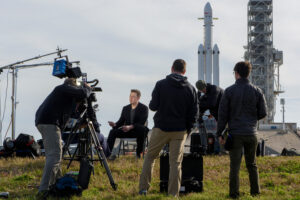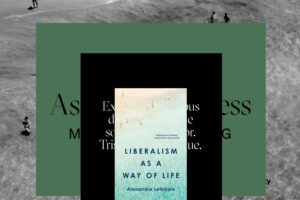Podcast University

During the 25 years that I taught politics, history, and philosophy at a very old university (Cambridge, England), I was aware of a constant drumbeat of anxiety that our pedagogical methods were out of date. It’s not hard to see where that fear came from. The basic building blocks of a university education were what they’d been for a hundred years or more: the seminar, the essay, the lecture. If those felt medieval that’s because some of them literally were. Academic seminars were a 19th-century invention; essays came from the 16th century; lectures started in the 14th century. In the age of digital technology, why should students want to sit in a drafty hall having stuff explained to them that they could readily find out online? Why would they think it made sense to write a thousand words on a topic that the internet could answer for them? Why, for that matter, would we even believe they’d written these essays themselves? Who would want to be stuck talking to the same old people week in, week out when a whole world of communication was just a click away?
It was obvious we would have to adapt. But no one was ever quite sure how. It seemed that to compete with the online world it was necessary to become more interactive and more empowering, allowing students a greater say over how they would be taught and about what. But nobody was much satisfied with whatever was tried: Academics grumbled that the teaching experience was being diluted and commodified; students seemed deeply underwhelmed with attempts to make them feel more involved. The truth is that nothing universities could offer by way of interactive engagement could compete with the addictive power of what was on students’ phones.
But with hindsight it’s clear we were worrying about the wrong things. As the digital revolution gathered pace there was plenty of evidence from outside the academy that what people wanted was more of what universities traditionally offered. That is, they wanted the spoken word, they wanted it delivered in person and—somewhat incredibly—they wanted it with a healthy dose of didacticism. This could be seen in the growing demand for literary festivals, which proliferated and flourished as platforms for writers to talk—often at length—about their books. The biggest of these gatherings in the UK—the Hay Festival (memorably described by Bill Clinton as “the Woodstock of the mind”)—could regularly fill huge tents with eager audiences hungry to listen to what could only be described as lectures: When writers talk about their books, they are rarely interested in anyone else’s point of view.
At the same time, the emergence of podcasting also suggested that the problem wasn’t the didactic format of the seminar and the lecture hall. Serious podcasts on history, politics, and philosophy started to gather huge audiences. They didn’t do it by being interactive. Instead, they provided their hosts and guests a chance to speak—often at great length—about the stuff they knew best. Listeners would simply have to lap it up. And lap it up they did, in their millions.
I began podcasting in 2015 while I was running the Politics Department at Cambridge. The impetus was simple. I noticed that a podcast series called LSE Lectures—from the London School of Economics—was riding high in the Apple podcast charts. I listened and found that these podcasts were indeed simply guest lectures, often on pretty technical subjects. What’s more, there was no editing and very little audio quality control: They literally sounded like they had been recorded in a drafty hall, which is presumably what had happened. I started to wonder what would be possible if the same level of seriousness was accompanied with a bit more by way of technical production values. A meeting with people from the podcast-host platform Acast confirmed my intuitions. It was both liberating and chastening. They said that highly successful podcasts could certainly be based around intellectually challenging material. But in the long run sound quality mattered more. I learned the two rules of podcasting. One, great content that sounds like it was recorded in a toilet will eventually lose out to toilet talk that sounds like it was recorded in a professional studio. Two, never miss a week: Any old episode is better than no episode at all.
To start with, the podcasts we made were funded by Cambridge University as part of an outreach program. But soon enough the money ran out—professional production didn’t come cheap back then, though thanks in part to AI, it’s got a lot cheaper since—and the audience we were reaching wasn’t huge. Other serious podcasts seemed to be doing it better. But what was it? We decided to try again, but this time on a commercial rather than an educational basis. We dropped the “brought to you by Cambridge University” bit and called ourselves Talking Politics. We took ads and sponsors. That’s when we made another discovery. People want university-style content, but on the whole they don’t want it from a university. They want to learn stuff without feeling that they’re part of an outreach program. They’re even willing to pay for it. Our audience grew tenfold. Within five years Talking Politics had racked up nearly 30 million downloads.
Again, book festivals should have provided a clue. I had often been struck that while public talks by well-known speakers—writers, politicians, celebrities—that were sponsored by my university and free to attend would struggle to attract an audience, the same speakers could sell out venues at nearby literary festivals when the attendees were being charged $20 a ticket. Part of the explanation is that when something is free people often don’t think it’s worth their while showing up for it. But that fact also seemed to suggest that there was something a little toxic about the higher education brand. Lecturing was fine. What was not fine was making listeners feel like they were expected to be grateful to receive all this superior wisdom. It’s almost impossible for university offerings for a wider public not to sound like they are talking down to the audience. The self-conscious attempt to render the material simple enough for the non-specialist only makes matters worse. It comes across as patronising. It also seems fake.
Podcasting works best when people feel like they’re listening in to a conversation rather than being talked to, never mind at. It is a remarkably intimate medium. But for just that reason it is well suited to the most serious and demanding forms of conversation: The intimacy carries the listener along. And it suits forms of communication that are not really a conversation at all. The most successful podcasts I have ever made were nothing but lectures. When COVID hit in 2020 and my university shut down, I decided to try offering the lectures I would have given to a few hundred students to a wider podcast audience instead. In the end, hundreds of thousands of people tuned in. But this only worked for two reasons. First, there was no suggestion that these were lectures. They were just chats. Second, I put away my notes and simply talked. The subject was political philosophy, but I tried to make each episode more like a story and less like an explanation. The paradox of podcasting is that there’s a huge demand for what universities do so long as it doesn’t come across as the sort of thing universities do.
I have now given up my paying job at Cambridge and am trying to make a living podcasting full time. I make a biweekly podcast about the history of ideas called Past Present Future. The competition is ferocious. There are a remarkable number of excellent podcasts out there on history, philosophy, and politics, and some of them have truly gigantic audiences. (Podcasting is a pretty secretive business and listener numbers are hard to access, but the most successful UK-based podcast—the outstanding The Rest Is History—probably reaches more people than all the students currently enrolled in all the higher education history courses around the world.) But it is still true that vanishingly few of these successful podcasts are university products, and the ones that are do their best to hide it.
That said, having left a university, I am very conscious of what I have lost. The intimacy of podcasting helps explain its appeal but also some of its limitations as an educational medium. Listening in on a conversation is not the same as participating in one. I know from my own experiences as a podcast consumer that ideas that can seem so stimulating as you hear them being picked over tend to be hard to recapture once the listening is done. There isn’t a lot to hold onto. What universities have that podcasts can’t recapture is the embeddedness of repeated exposure to interpersonal interaction. Even if it’s frustrating, being stuck talking to the same old people week in, week out is part of what makes learning effective. Those people may simply be the ones you sit next to in a lecture hall. And the lecture may have been a boring one. But at least you can talk afterwards to your fellow victim about what made it quite so boring. Being on a train with earphones plugged in to a scintillating episode of The Rest of History alongside someone who is doing what you are doing is not the same.
The thing I think I miss most about being at a university is the research seminar. Universities are not much good—in fact, they’re notoriously bad—at getting academics to question their background assumptions about the world. Groupthink often prevails at the political level. But they are excellent for working over the details of anyone’s case for just about anything. Having 20 smart people nitpick the ins and outs of a complicated argument to see where its weak spots are is not something I’ve seen replicated anywhere else: not in a boardroom, not at a literary festival, not on a podcast. Academic seminars, like academic lectures, can often be frustrating. But the revelations, when they come, tend to stick. It’s a bit like warfare: long periods of tedium punctuated by the occasional truly life-changing moment. I would like to think that some people’s lives might be improved by listening to podcasts. But I don’t think their lives are often changed by them.
So much for seminars and lectures. What about the humble essay? Last summer on Past Present Future I made a series that proved quite popular in which I gave a series of talks—OK, lectures, but never call them that—about the Great Political Essays, from Montaigne to Ta-Nehisi Coates via Thoreau and Woolf, Orwell and Baldwin, Sontag and Didion. Part of the reason was pragmatic: Essays are usually a lot shorter than books so it’s easier to do the required reading. (For our subsequent series on the Great Political Fictions, trying to get through Atlas Shrugged in time to talk about it nearly killed me.) But it was also because I was genuinely curious to think about what makes a great essay and how to describe that. At which point it struck me that although I’d been asking students to write essays for 25 years—and had written more than a few myself—I’d never really thought about the form and its merits. It turns out that the best essays are electrifying precisely because they are essays: brief intellectual journeys into the unknown. They can be looser than books, more surprising than books, more energising that books. Who knew?
That’s the main educational lesson I’ve taken in moving from university life to podcast life: I’m the one who’s learned a lot. In fact, making podcasts has been the most educational experience of my life. It’s forced me to read many of the great books I’d managed to go through my time as a university professor never having read. And I’ve discovered that almost all of them (maybe even Atlas Shrugged) have their iconic status for a reason: The ideas they contain are extraordinary. Podcasting has also forced me to ask, for the first time, why it’s worth both writing and reading essays. Now I think I know the answer. What I want to do next is go back to university so I can finally get around to talking to students about that too.
David Runciman is Honorary Professor of Politics at Cambridge University and the host of the twice-weekly podcast Past Present Future, which explores the history of ideas. The podcast is currently on a deep dive into the history of revolutionary ideas. His most recent book is The History of Ideas: Equality, Justice and Revolution.


